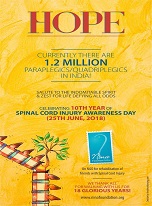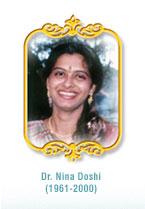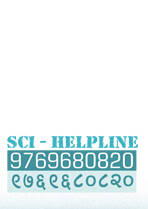 |
 |
|

What is Spinal Cord Injury?
A spinal cord injury usually begins with a sudden, traumatic blow to the spine that fractures or dislocates the vertebrae. The damage begins at the moment of injury when displaced bone fragments, disc material, or ligaments bruise or tear into the spinal cord tissue. Most injuries to the spinal cord don't completely sever it. Instead, an injury
is more likely to cause fractures and compression of the vertebrae, which then crush and destroy the axons,
extensions of nerve cells that carry signals up and down the spinal cord between the brain and the rest of the body.
An injury to the spinal cord can damage a few, many, or almost all of these axons. Some injuries will allow almost
complete recovery. Others will result in complete paralysis.
Causes of spinal cord injury is trauma caused due to accidents - vehicle, gunshot,
fall from height
adventure sports - biking, scuba diving, rock climbing, river rafting, surfing, paragliding
or due to diseases of the spine.
Is there any treatment?
Improved emergency care for people with spinal cord injuries and aggressive treatment and rehabilitation
can minimize damage to the nervous system and even restore limited abilities. Respiratory complications are
often an indication of the severity of spinal cord injury About one-third of those with injury to the
neck area will need help with breathing and require respiratory support. The steroid drug methylprednisolone
appears to reduce the damage to the nerve cells if it is given within the first 8 hours after injury.
Rehabilitation programs combine physical therapies with skill-building activities and counseling to provide social
and emotional support.
What is the prognosis?
Spinal cord injuries are classified as either complete or incomplete. An incomplete injury means that the
ability of the spinal cord to convey messages to or from the brain is not completely lost. People with
incomplete injuries retain some motor or sensory function below the injury. A complete injury is indicated
by a total lack of sensory and motor function below the level of injury. People who survive a spinal cord injury
will most likely have medical complications such as chronic pain and bladder and bowel dysfunction, along with
an increased susceptibility to respiratory and heart problems. Successful recovery depends upon how well
these chronic conditions are handled day to day.
What research is being done?
The National Institute of Neurological Disorders and Stroke (NINDS) conducts spinal cord research in its
laboratories at the National Institutes of Health (NIH) and also supports additional research through
grants to major medical institutions across the country. Advances in research are giving doctors and
patients a hope that repairing injured spinal cords is a reachable goal. Advances in basic research are also
being matched by progress in clinical research, especially in understanding the kinds of physical rehabilitation
that work best to restore function. Some of the more promising rehabilitation techniques are helping spinal cord injury
patients become more mobile.
For more Information: sci_india@yahoogroups.com
Indian Rehabilitation Centres :
| Address: | Christian Medical College Bagayam, Tamil Nadu, Vellore - 632002 |
|---|---|
| Tel.: | 0416 - 228 3429 / 228 3430 |
| Address: | Indian Spinal Injuries Centre, Sector C, Vasant Kunj, Opp. Vasant Valley School, New Delhi - 110070 |
|---|---|
| Tel.: | 011-4225 5225 (30 Lines) |
| Emg.: | 011-4225 5225 |
| Fax: | 011-2689 9147, 011-2689 8810 |
| E-mail: | www.isiconline.org |
International Rehabilitation Centres :
| Address: | Christopher Reeve Foundation & Resource Center,
636 Morris Turnpike Suite 3A Short, Hills, NJ 07078. |
|---|---|
| Tel.: | 973-379-2690 800-225-0292 |
| Fax: | 973-912-9433 |
| E-mail: | info@christopherreeve.org |
| Website: | www.christopherreeve.org |
| Address: | National Rehabilitation Information Center (NARIC) 4200 Forbes Boulevard Suite 202 Lanham, MD 20706-4829 |
|---|---|
| Tel.: | 301-459-5900/301-459-5984 (TTY) 800-346-2742 |
| Fax: | 301-562-2401 |
| E-mail: | naricinfo@heitechservices.com |
| Website: | www.naric.com |
| Address: | Miami Project to Cure Paralysis Buoniconti Fund P.O. Box 016960 R-48 Miami, FL 33101-6960 |
|---|---|
| Tel.: | 305-243-6001 800- STANDUP(782-6387) |
| Fax: | 305-243-6017 |
| Website: | www.themiamiproject.org |
| Address: | National Spinal Cord Injury Association 6701 Democracy Blvd. #300-9 Bethesda, MD 20817 |
|---|---|
| Tel.: | 800-962-9629 |
| Fax: | 301-963-1265 |
| E-mail: | info@spinalcord.org |
| Website: | www.spinalcord.org |
| Address: | Paralyzed Veterans of America (PVA) 801 18th Street, NW Washington, DC 20006-3517 |
|---|---|
| Tel.: | 202-USA-1300 (872-1300) |
| Fax: | 202-785-4452 |
| E-mail: | info@pva.org |
| Website: | www.pva.org |
| Address: | Spinal Cord Society 19051 County Highway 1 Fergus Falls, MN 56537 |
|---|---|
| Tel.: | 218-739-5252 / 218-739-5261 |
| Fax: | 218-739-5262 |
| Website: | members.aol.com/scsweb |
| Address: |
Clearinghouse on Disability Information Special Education& Rehabilitative Services Communications & Customer Service Team 550 12th Street, SW, Rm. 5133, Washington, DC 20202-2550 |
|---|---|
| Tel.: | 202-245-7307 / 202-205-5637 (TTD) |
| Fax: | 292024507636 |
| Address: |
National Institute on Disability and Rehabilitation Research (NIDRR) U.S . Department of Education Office of Special Education and Rehabilitative Services 400 Maryland Ave., S.W. Washington, DC 20202-7100 |
|---|---|
| Tel.: | 202-245-7460 / 202-245-7316 (TTY) |

